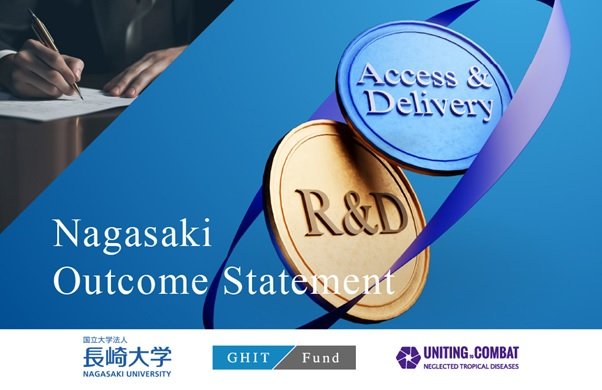
Today, leading organizations signed and adopted the “Nagasaki Outcomes Statement” which calls for accelerated R&D, access, and delivery for neglected tropical diseases (NTDs).
NTDs are a group of 20 preventable and treatable diseases that affect more than 1.6 billion people worldwide, particularly communities in low-income countries. Despite the need for diagnostics, vaccines and therapeutics, NTDs are under-researched, under-treated and under-funded.
To address this challenge, global health leaders convened at the Commemorative Symposium for G7 Health Ministers Meeting in Nagasaki, Japan, “Accelerating Research and Development, Access and Delivery for Neglected Tropical Diseases”, to agree the “Nagasaki Outcomes Statement” and call for sustainable financing and equitable access to interventions for NTDs. This call was answered by the Prime Minister of Japan, Fumio Kishida, who at the G7 Summit announced a commitment of US$200 million to GHIT Fund for R&D over five years.
The Statement builds on and reaffirms the "Kigali Declaration on NTDs*1" a high-level political declaration that is mobilizing political will, community commitment, resources and action, and securing commitments needed to end suffering caused by NTDs. The Statement outlines how tackling NTDs is critical to achieving G7’s ambitions on UHC*2 and pandemic preparedness.
In addition to six asks to G7 Leaders to support investments in R&D, access and delivery, the Statement recognizes that there is a key role for the global NTD community to play. Seven call-to-actions are outlined for the NTD community including developing innovative funding mechanisms to mobilize substantial funding for NTD elimination.
Six asks to the G7 Leaders (abridged version: see full text in Appendix)
- G7 Leaders to renew their commitment to end NTDs by translating these commitments into ongoing political prioritization, bold action, and investments.
- The G7 should support long-term, sustainable financing for not-for-profit/alternative models of R&D, for example, Product Development Partnerships (PDPs), as well as strategies and partnerships to ensure access to, and delivery of, the resulting products.
- G7 Leaders to further prioritize NTDs and to champion NTDs at future G7, G20 Summits and other high-level political fora like the UNGA.
- The G7 should leverage their resources to support sustainable research networks rooted in NTD-endemic countries, developing new health tools that can be used at the primary health care (PHC) level promoting south-south collaboration and capacity building, ultimately accelerating R&D and equitable access to health solutions for NTD.
- G7 should leverage some of the access initiatives like Pooled Procurement Mechanisms (PPMs) and to be also used for the procurement of NTD health technologies.
- G7 Leaders to continue supporting the World Health Organization (WHO) Global NTD program and all WHO member states to ensure that NTDs are not ‘neglected’, even within the WHO.
Seven Calls to Action for Global Community (abridged version: see full text in Appendix)
- Increase visibility of NTDs from the community level, at country, regional and global levels to highlight the socio-economic impact of NTDs.
- Endemic countries to take more political leadership and ensure efficient use of resources by leveraging and increasing existing resource mobilization, sustainable procurement, and service delivery platforms for the delivery of integrated, cross-sectoral people-centered services for NTDs.
- Develop innovative funding mechanisms to mobilize substantial funding for NTD control and elimination.
- Resource mobilization for the most severely underfunded NTDs should be prioritized.
- All R&D actors and partners need to promote knowledge and technology sharing more openly and more transparently, by encouraging sharing of research knowledge, data, and costs throughout the R&D process to improve efficiency in R&D and access.
- Re-evaluate all the steps across the access value chain (AVC) from innovation to access and delivery and explore ways to improve and accelerate the process to foster a seamless end-to-end ecosystem.
- Connect, coordinate, and create a multisectoral approach, enabling end-to-end ecosystem for the acceleration of R&D, access and delivery.
Signed by approximately 20 organizations and individuals*3 including Uniting to Combat NTDs, Nagasaki University and GHIT Fund, the Nagasaki Outcomes Statement commends G7 Leaders for including NTDs in the G7 Leaders’ communiqué, and for prioritizing universal health coverage (UHC*2) and pandemic preparedness. It urges Leaders to continue to support investments in R&D for vaccines, new drugs and diagnostics for NTDs, as well as financing to ensure access of these innovations and technologies to the most vulnerable populations affected by NTDs.